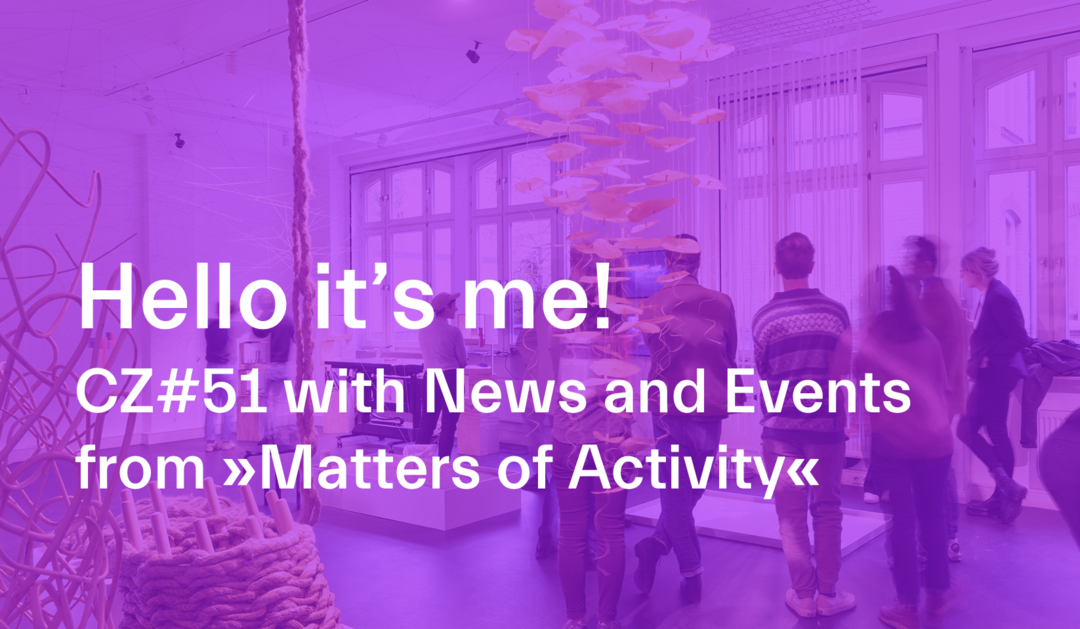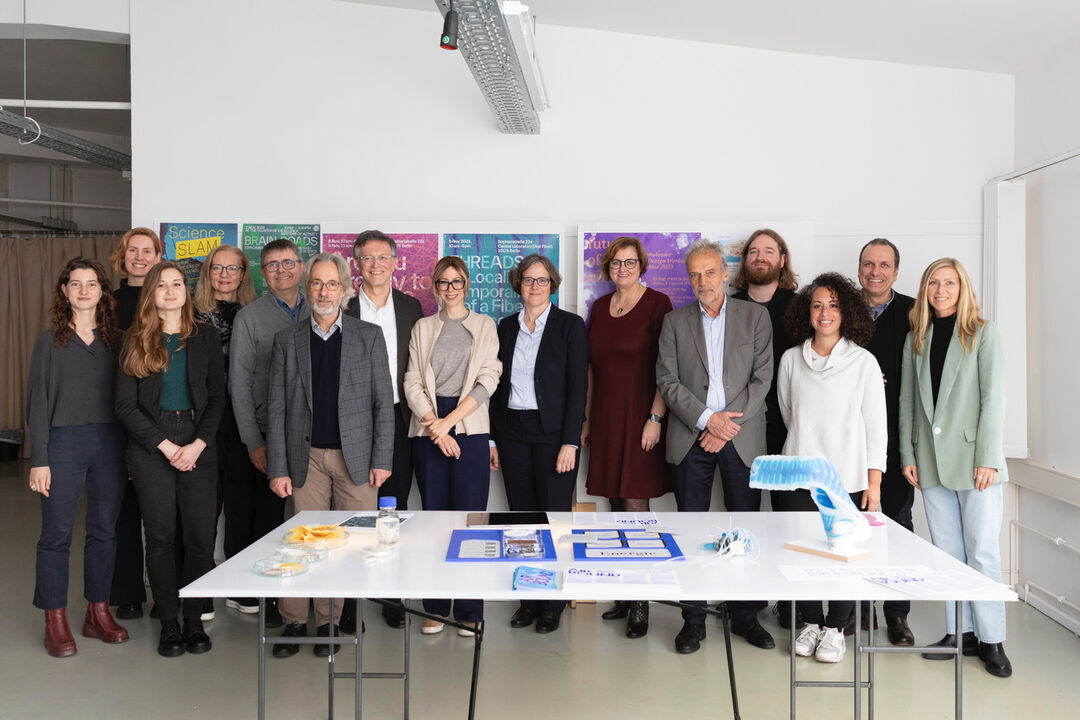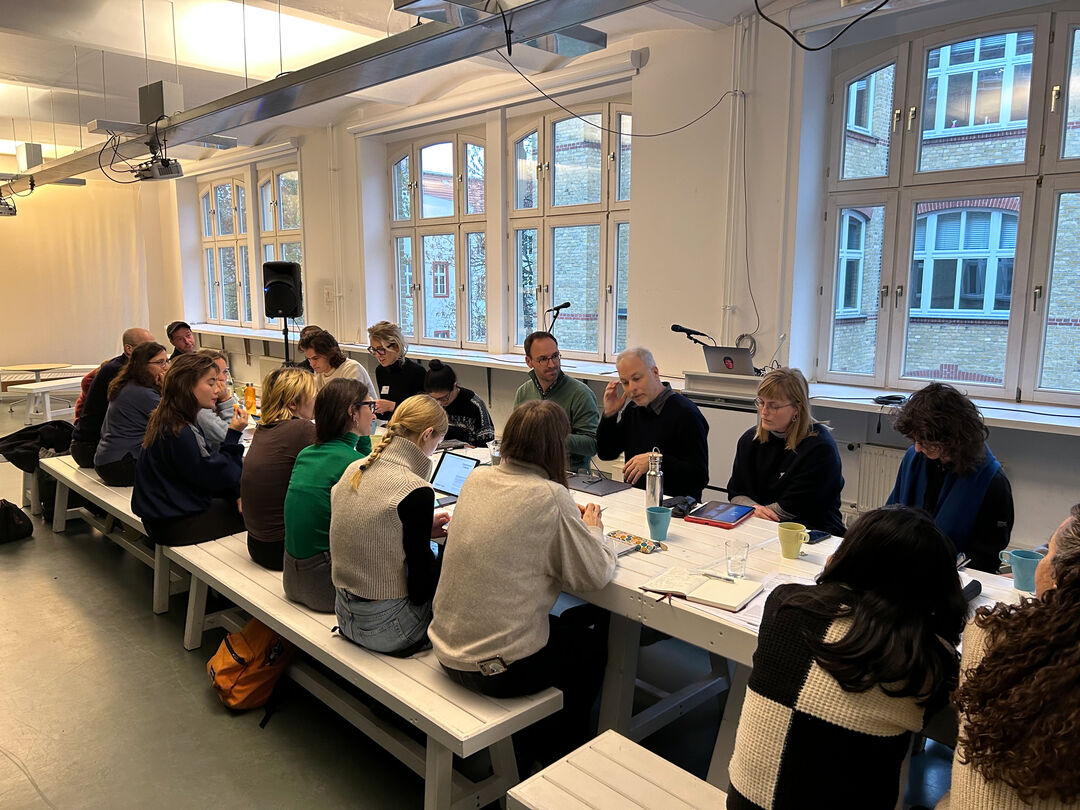|
|
 |
 |
|
|

|
 |
Opening of MoA's Activarium, 8 November 2023. Copyright: Matters of Activity
|
|
EDITORIAL Dear Friends of »Matters of Activity«,
Wow! We've had some really eventful weeks behind us - with a visit from the Berlin Senator for Research, the Berlin Science Week and the opening of the Activarium – MoA's new showroom – to name just a few highlights. We are extremely proud that »Matters of Activity« was visible at Berlin Science Week with more events than ever before and thus was able to draw the attention of many new interested parties to its research. For all those who were unable to attend all the events, we highly recommend reading the reviews in this issue.
But let's not lean back just yet, we are looking forward to an exciting December wit the conference »Architectured Materials Across Scales« at Harnack House, and the workshop »Site-Writing with Technologies of Capture« at the Museum of Decorative Arts.
Enjoy reading!
Antje Nestler, Carolin Ott & Franziska Wegener
|
 |
|
Liebe Freund:innen von »Matters of Activity«,
wow, da liegen wirklich ereignisreiche Wochen hinter uns - mit dem Besuch der Wissenschaftssenatorin, der Berlin Science Week und der Eröffnung des Activariums - MoA's neuer Showroom - nennen wir nur einige Highlights. Wir sind sehr stolz darauf, dass »Matters of Activity« auf der Berlin Science Week mit so vielen Veranstaltungen wie noch nie sichtbar war und so viele neue Interessierte auf die Clusterforschung aufmerksam machen konnte. All jenen, die nicht an allen Veranstaltungen teilnehmen konnten, sei die Lektüre der Rückblicke in dieser Ausgabe wärmstens empfohlen.
Doch nun lehnen wir uns nicht zurück, sondern freuen uns auf einen spannenden Dezember mit der Konferenz »Architectured Materials Across Scales« im Harnack-Haus und dem Workshop »Site-Writing with Technologies of Capture« im Kunstgewerbemuseum.
Viel Spaß bei der Lektüre!
Antje Nestler, Carolin Ott & Franziska Wegener
|
 |
|
|
|
|
 |
| »Matters of Activity« welcomed Dr. Ina Czyborra |
| Berlin Senator for Higher Education and Research, Health, and Long-Term Care visits all Berlin Clusters of Excellence |
 |
|
|

|
 |
Berlin Senator for Higher Education and Research, Health and Long-Term Care, Dr. Ina Czyborra, as a guest at Matters of Activity, 30 October 2023. Copyright: Matters of Activity
|
|
14.11.2023
|
 |
|
On Monday, October 30th, »Matters of Activity« welcomed the Berlin Senator for Higher Education and Research, Health and Long-Term Care, Dr. Ina Czyborra, as a guest at the Humboldt-Universität zu Berlin. The directors of the Cluster of Excellence, Prof. Dr. Claudia Mareis, Prof. Dr. Wolfgang Schäffner, Prof. Dr. Peter Fratzl and Prof. Dr. Horst Bredekamp, were joined by HU President Prof. Dr. Julia von Blumenthal and HU Vice President for Research Prof. Dr. Christoph Schneider.
After a presentation of the four Cluster spokespersons about the current research of »Matters of Activity«, MoA researchers gave concrete insights into three research fields: Microbiologist Prof. Dr. Regine Hengge and transdisciplinary designer Emma Sicher spoke about the productive interweaving of microbiology and design in research on bacterial cellulose. Cultural and media scientists Dr. Martin Müller and Léa Perraudin gave insights into the work of »CollActive Materials«, an experimental laboratory where people from society and science speculate together about the materials of tomorrow. Prof. Dr. Igor Sauer, head of Experimental Surgery at Charité, and interaction designer Anna Schäffner showed how surgical robots can interact more intelligently with their environment in the future.
The visit is part of a series in which the senator visits Berlin's seven Clusters of Excellence to gain insight into their work and importance for the city.
→ more
|
 |
|
|
|
|
 |
| Threads: Localities & Temporalities of a Fiber Bio-Economy |
| Recap of the Workshop on 8 November |
 |
|
|
 |
| Workshop »Threads«, 8 November 2023. Copyright: Matters of Activity
|
 |
|
The second event in the »Activating Circular Network» series unfolded on November 8th, 2023 as a pivotal part of MoA Berlin Science Week. The aim of the organizers Lucy Norris, Hanna Wiesener and Khashayar Razghandi was to bring together diverse actors — researchers, designers, entrepreneurs, activists, and artists — to explore the complexities of transitioning to a bio-economy of natural fibres. The one-day event comprised two sessions, ›Localities‹ and ›Temporalities‹, where around 60 participants engaged with speakers invited to give short impulse talks, panels, and workshops, to discuss the challenges of different production cycles, building regional supply chains, the potential of new resources, and alternative perspectives on the transition to a bio-economy in which fibres will play a key role. → more
|
 |
|
|
|
|
 |
| Critical Times. Part I: Multiple Matter |
| Workshop with Contributions by T. J. Demos, Sandra Jasper, Kiran Pereira & David Weber-Krebs |
 |
|
|

|
 |
Workshop participants discussing T.J. Demos recent book »Against the Anthropocene: Visual Culture and Environment Today« with the author. »Critical Times« at »Matters of Activity«, 17 & 18 November 2023
|
|
17.11.2023–18.11.2023
|
 |
|
Material Form Function | Temporality Time has become an increasingly critical factor and concept in the wake of Anthropocene debates. With the workshop »Critical Times. Part I: Multiple Matter«, which took place at »Matters of Activity« on November 17 and 18, the organizers asked, what times and temporalities shape the pressing crises of the present but also what temporalities allow for a critical response to a homogenizing crisis of such a present. The focus of the workshop resided in the conjunctions between speculative practices and narratives, other-than-scientific modes of sense-making as well as enchanting, violent, or haunting counter-/temporalities unfolding through eco-artistic practices. Around twenty-five multidisciplinary workshop participants engaged in discussions together with our invited guests — T.J. Demos, Sandra Jasper, Kiran Pereira and David Weber-Krebs.
→ more
|
 |
|
|
|
|
 |
| Neue Episoden von »Exzellent Erklärt« |
| Dieses Mal mit den Berliner Clustern »Science of Intelligence« und »MATH+« |
 |
|
|
 |
| Exzellent Erklärt. Copyright: Science of Intelligence & MATH+ |
 |
|
Podcast | Exzellent Erklärt Hört rein in die neuen Folgen des Wissenschaftspodcasts »Exzellent Erklärt« mit spannenden Interviews mit unseren Berliner Kolleg:innen:
SCIoI
Wir wissen noch erstaunlich wenig über Intelligenz. Zum Beispiel wissen wir nicht, wie sie entsteht. Das Cluster »Science of Intelligence« in Berlin versucht, dazu grundlegende Hypothesen aufzustellen. Dazu forschen sie sowohl an Tieren wie Kakadus oder Fischen, gehen aber auch neue Wege und programmieren Roboter, um bestimmte Verhaltensweisen zu erforschen. Robotiker und Cluster Sprecher Prof. Dr. Oliver Brock klärt uns auf.
MATH+
In dieser Podcastfolge beantworten der MATH+ Cluster-Sprecher, Prof. Michael Hintermüller, und die Nachwuchsgruppenleiterin Dr. Sarah Wolf die spannende Frage, ob Mathematik die Welt verbessern kann. Sie sprechen darüber, wie sich die anwendungsorientierte Mathematik von MATH+ mit anderen Disziplinen bei relevanten Zukunftsfragen einbringt, zum Beispiel bei der nachhaltigen Energieversorgung und Mobilität oder der Verkehrsplanung. Sie erzählen auch davon, wie mit Hilfe mathematischer Modelle schmerzstillende Medikamente entworfen werden, die wirksam sind, aber nicht süchtig machen.
Natürlich sind die Folgen 35 und 36 ebenso spannend! ↗ more
|
 |
|
|
|
|
|